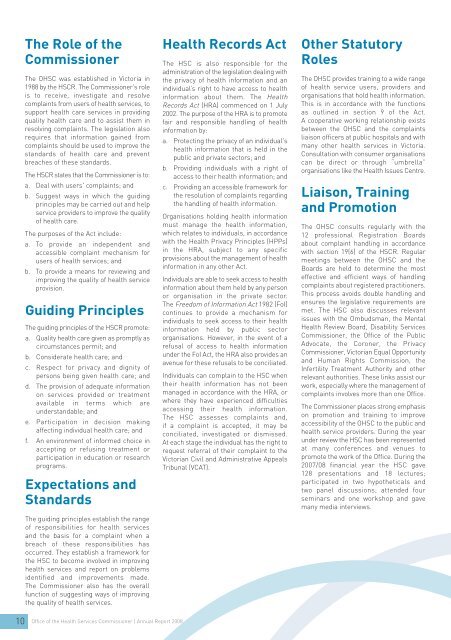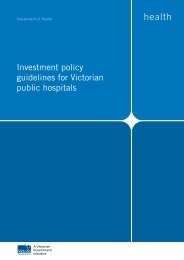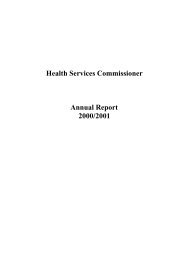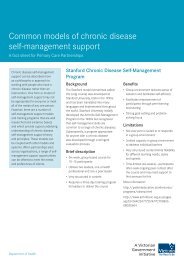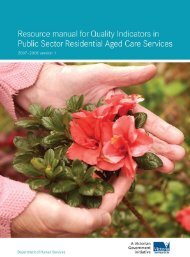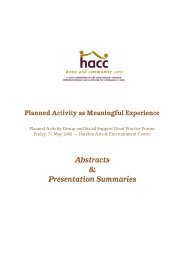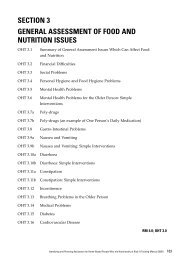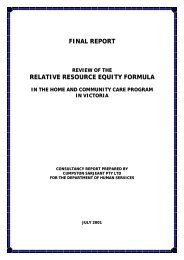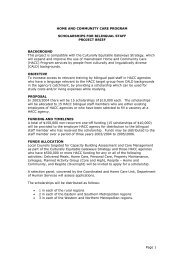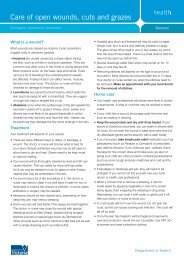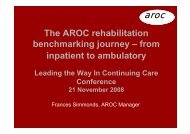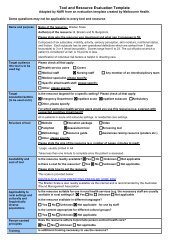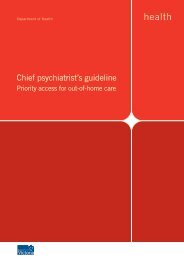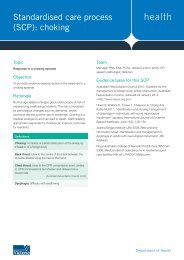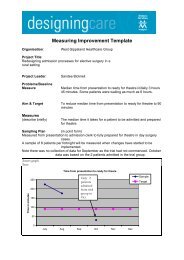Office of the Health Services Commissioner Annual Report 2008
Office of the Health Services Commissioner Annual Report 2008
Office of the Health Services Commissioner Annual Report 2008
You also want an ePaper? Increase the reach of your titles
YUMPU automatically turns print PDFs into web optimized ePapers that Google loves.
The Role <strong>of</strong> <strong>the</strong><br />
<strong>Commissioner</strong><br />
The OHSC was established in Victoria in<br />
1988 by <strong>the</strong> HSCR. The <strong>Commissioner</strong>'s role<br />
is to receive, investigate and resolve<br />
complaints from users <strong>of</strong> health services, to<br />
support health care services in providing<br />
quality health care and to assist <strong>the</strong>m in<br />
resolving complaints. The legislation also<br />
requires that information gained from<br />
complaints should be used to improve <strong>the</strong><br />
standards <strong>of</strong> health care and prevent<br />
breaches <strong>of</strong> <strong>the</strong>se standards.<br />
The HSCR states that <strong>the</strong> <strong>Commissioner</strong> is to:<br />
a. Deal with users' complaints; and<br />
b. Suggest ways in which <strong>the</strong> guiding<br />
principles may be carried out and help<br />
service providers to improve <strong>the</strong> quality<br />
<strong>of</strong> health care.<br />
The purposes <strong>of</strong> <strong>the</strong> Act include:<br />
a. To provide an independent and<br />
accessible complaint mechanism for<br />
users <strong>of</strong> health services; and<br />
b. To provide a means for reviewing and<br />
improving <strong>the</strong> quality <strong>of</strong> health service<br />
provision.<br />
Guiding Principles<br />
The guiding principles <strong>of</strong> <strong>the</strong> HSCR promote:<br />
a. Quality health care given as promptly as<br />
circumstances permit; and<br />
b. Considerate health care; and<br />
c. Respect for privacy and dignity <strong>of</strong><br />
persons being given health care; and<br />
d. The provision <strong>of</strong> adequate information<br />
on services provided or treatment<br />
available in terms which are<br />
understandable; and<br />
e. Participation in decision making<br />
affecting individual health care; and<br />
f. An environment <strong>of</strong> informed choice in<br />
accepting or refusing treatment or<br />
participation in education or research<br />
programs.<br />
Expectations and<br />
Standards<br />
The guiding principles establish <strong>the</strong> range<br />
<strong>of</strong> responsibilities for health services<br />
and <strong>the</strong> basis for a complaint when a<br />
breach <strong>of</strong> <strong>the</strong>se responsibilities has<br />
occurred. They establish a framework for<br />
<strong>the</strong> HSC to become involved in improving<br />
health services and report on problems<br />
identified and improvements made.<br />
The <strong>Commissioner</strong> also has <strong>the</strong> overall<br />
function <strong>of</strong> suggesting ways <strong>of</strong> improving<br />
<strong>the</strong> quality <strong>of</strong> health services.<br />
<strong>Health</strong> Records Act<br />
The HSC is also responsible for <strong>the</strong><br />
administration <strong>of</strong> <strong>the</strong> legislation dealing with<br />
<strong>the</strong> privacy <strong>of</strong> health information and an<br />
individual’s right to have access to health<br />
information about <strong>the</strong>m. The <strong>Health</strong><br />
Records Act (HRA) commenced on 1 July<br />
2002. The purpose <strong>of</strong> <strong>the</strong> HRA is to promote<br />
fair and responsible handling <strong>of</strong> health<br />
information by:<br />
a. Protecting <strong>the</strong> privacy <strong>of</strong> an individual's<br />
health information that is held in <strong>the</strong><br />
public and private sectors; and<br />
b. Providing individuals with a right <strong>of</strong><br />
access to <strong>the</strong>ir health information; and<br />
c. Providing an accessible framework for<br />
<strong>the</strong> resolution <strong>of</strong> complaints regarding<br />
<strong>the</strong> handling <strong>of</strong> health information.<br />
Organisations holding health information<br />
must manage <strong>the</strong> health information,<br />
which relates to individuals, in accordance<br />
with <strong>the</strong> <strong>Health</strong> Privacy Principles (HPPs)<br />
in <strong>the</strong> HRA, subject to any specific<br />
provisions about <strong>the</strong> management <strong>of</strong> health<br />
information in any o<strong>the</strong>r Act.<br />
Individuals are able to seek access to health<br />
information about <strong>the</strong>m held by any person<br />
or organisation in <strong>the</strong> private sector.<br />
The Freedom <strong>of</strong> Information Act 1982 (FoI)<br />
continues to provide a mechanism for<br />
individuals to seek access to <strong>the</strong>ir health<br />
information held by public sector<br />
organisations. However, in <strong>the</strong> event <strong>of</strong> a<br />
refusal <strong>of</strong> access to health information<br />
under <strong>the</strong> FoI Act, <strong>the</strong> HRA also provides an<br />
avenue for <strong>the</strong>se refusals to be conciliated.<br />
Individuals can complain to <strong>the</strong> HSC when<br />
<strong>the</strong>ir health information has not been<br />
managed in accordance with <strong>the</strong> HRA, or<br />
where <strong>the</strong>y have experienced difficulties<br />
accessing <strong>the</strong>ir health information.<br />
The HSC assesses complaints and,<br />
if a complaint is accepted, it may be<br />
conciliated, investigated or dismissed.<br />
At each stage <strong>the</strong> individual has <strong>the</strong> right to<br />
request referral <strong>of</strong> <strong>the</strong>ir complaint to <strong>the</strong><br />
Victorian Civil and Administrative Appeals<br />
Tribunal (VCAT).<br />
O<strong>the</strong>r Statutory<br />
Roles<br />
The OHSC provides training to a wide range<br />
<strong>of</strong> health service users, providers and<br />
organisations that hold health information.<br />
This is in accordance with <strong>the</strong> functions<br />
as outlined in section 9 <strong>of</strong> <strong>the</strong> Act.<br />
A cooperative working relationship exists<br />
between <strong>the</strong> OHSC and <strong>the</strong> complaints<br />
liaison <strong>of</strong>ficers at public hospitals and with<br />
many o<strong>the</strong>r health services in Victoria.<br />
Consultation with consumer organisations<br />
can be direct or through “umbrella”<br />
organisations like <strong>the</strong> <strong>Health</strong> Issues Centre.<br />
Liaison, Training<br />
and Promotion<br />
The OHSC consults regularly with <strong>the</strong><br />
12 pr<strong>of</strong>essional Registration Boards<br />
about complaint handling in accordance<br />
with section 19(6) <strong>of</strong> <strong>the</strong> HSCR. Regular<br />
meetings between <strong>the</strong> OHSC and <strong>the</strong><br />
Boards are held to determine <strong>the</strong> most<br />
effective and efficient ways <strong>of</strong> handling<br />
complaints about registered practitioners.<br />
This process avoids double handling and<br />
ensures <strong>the</strong> legislative requirements are<br />
met. The HSC also discusses relevant<br />
issues with <strong>the</strong> Ombudsman, <strong>the</strong> Mental<br />
<strong>Health</strong> Review Board, Disability <strong>Services</strong><br />
<strong>Commissioner</strong>, <strong>the</strong> <strong>Office</strong> <strong>of</strong> <strong>the</strong> Public<br />
Advocate, <strong>the</strong> Coroner, <strong>the</strong> Privacy<br />
<strong>Commissioner</strong>, Victorian Equal Opportunity<br />
and Human Rights Commission, <strong>the</strong><br />
Infertility Treatment Authority and o<strong>the</strong>r<br />
relevant authorities. These links assist our<br />
work, especially where <strong>the</strong> management <strong>of</strong><br />
complaints involves more than one <strong>Office</strong>.<br />
The <strong>Commissioner</strong> places strong emphasis<br />
on promotion and training to improve<br />
accessibility <strong>of</strong> <strong>the</strong> OHSC to <strong>the</strong> public and<br />
health service providers. During <strong>the</strong> year<br />
under review <strong>the</strong> HSC has been represented<br />
at many conferences and venues to<br />
promote <strong>the</strong> work <strong>of</strong> <strong>the</strong> <strong>Office</strong>. During <strong>the</strong><br />
2007/08 financial year <strong>the</strong> HSC gave<br />
128 presentations and 18 lectures;<br />
participated in two hypo<strong>the</strong>ticals and<br />
two panel discussions; attended four<br />
seminars and one workshop and gave<br />
many media interviews.<br />
10<br />
<strong>Office</strong> <strong>of</strong> <strong>the</strong> <strong>Health</strong> <strong>Services</strong> <strong>Commissioner</strong> | <strong>Annual</strong> <strong>Report</strong> <strong>2008</strong>


